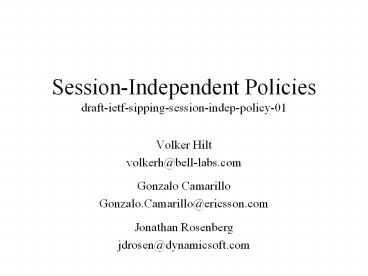Session-Independent Policies draft-ietf-sipping-session-indep-policy-01 - PowerPoint PPT Presentation
Title:
Session-Independent Policies draft-ietf-sipping-session-indep-policy-01
Description:
forbid element values must be removed. set_all element values must be added. ... forbid set_all media maxnoStreams 4 /maxnoStreams type audio /type ... – PowerPoint PPT presentation
Number of Views:22
Avg rating:3.0/5.0
Title: Session-Independent Policies draft-ietf-sipping-session-indep-policy-01
1
Session-Independent Policiesdraft-ietf-sipping-se
ssion-indep-policy-01
- Volker Hilt
- volkerh_at_bell-labs.com
- Gonzalo Camarillo
- Gonzalo.Camarillo_at_ericsson.com
- Jonathan Rosenberg
- jdrosen_at_dynamicsoft.com
2
Session-Independent Policies
- Major revision since 00.
- Session-independent policy delivery mechanism.
- Based on the config-framework.
- UAs subscribe to policy servers using the
following profiles. - user profile retrieve policies of the users AoR
domain. - local profile retrieve policies of the access
network. - Rules when to sent a subscribe.
3
Policy Schema
- Generic policy schema defines common elements and
attributes. - XML schemas for specific policies.
- Media policies
- Protocol policies
- Media routing policies
4
Policy Schema Structure
- Specifying constraints in policy schemas.
- Simple restrictions.
- Example maximum bandwidth (mandatory).
- UA needs to select multiple values.
- Multiple instances can be present in a session.
- Example audio (mandatory), video (allowed),
application (denied). - UA needs to select a single value.
- One instance needs to be selected for a session.
- Example codec PCMU (allowed), PCMA (allowed),
G729 (denied). - Constraints
- Mandatory, allowed, denied.
5
XML Containers
- Container-based approach
- Containers define the constraining properties of
a policy elements. - Policy elements modify the working profile
(settings used by a UA). - ltforbidgt element values must be removed.
- ltset_allgt element values must be added.
- ltset_onegt one of the values must be added.
- ltset_anygt element values may be added.
- Characteristic/Issues
- Well aligned with the data set framework.
- Based on concept of working profile.
- Flexible and complex.
ltforbidgt ltmediagt lttype /gt
ltcodecgtPCMUlt/codecgt lt/mediagt lt/forbidgt ltset_allgt
ltmediagt ltmaxnoStreamsgt4
lt/maxnoStreamsgt lttypegtaudiolt/typegt
lt/mediagt lt/set_allgt ltset_anygt ltmediagt
lttypegtvideolt/typegt lt/mediagt lt/set_anygt
6
XML Attributes
- Attribute-based approach
- "Policy" attribute defines constraining
properties of elements. - "Mandatory" - must be used in sessions.
- "Allow" - may be used in sessions.
- "Deny" - can not be used in sessions.
- Policy schemas specify the use of this attribute
for elements. - Default policies for an element require a
separate element. - Example ltdefault-codecgt defines policy for
codecs not listed. - Characteristic
- Session-based.
- Required semantics.
- Simple.
ltmediagt ltmaxnoStreamsgt4lt/maxnoStreamsgt
ltdefault-type policy"disallow" /gt lttype
policy"mandatory"gtaudiolt/typegt lttype
policy"allow"gtvideolt/typegt ltdefault-codec
policy"allow" /gt ltcodec policy"deny"gtPCMUlt/cod
ecgt lt/mediagt
7
Conflict Resolution
- Session policies from different sources may be in
conflict. - General conflict resolution mechanisms are very
complex. - Out of scope for this draft!!
- Proposal
- Specific rules for merging policies in a policy
schema. - Default behavior for conflicts that cant be
resolved (e.g. alert user). - Special treatment for emergency calls?
8
Session-Specific Policiesdraft-hilt-sipping-sessi
on-spec-policy-01
- Volker Hilt
- volkerh_at_bell-labs.com
- Gonzalo Camarillo
- Gonzalo.Camarillo_at_ericsson.com
- Jonathan Rosenberg
- jdrosen_at_dynamicsoft.com
9
Session-Specific Policies
- Major revision since 00.
- Mechanism based on the separate channel model.
- Architecture
- Proxy provides the URI of the local policy
server to UA. - Policy server receives session information from
UA and returns session policies. - Policy enforcement point may be present to
enforce policies. Out of scope for this draft.
Proxy
Proxy
UA A
Policy Server PS A
Policy Server PS B
UA B
Router w/ Policy Enforcmnt
Router w/ Policy Enforcmnt
10
Distributing PS URIs
- Two new header fields
- Policy-contact header
- Convey the policy server URI from proxy to UAs.
- Policy-Id header
- Used by UAC to identify the policy servers used.
11
Contacting the Policy Server
- When / with which information does a UA contact
the PS? - Offer generally needed for session-specific
policies. - Answer needed if policies apply to
answer-specific information (e.g., IP address and
port). - BYE needed by PS to free resources (e.g. close
firewall pinholes, terminate asynchronous policy
updates). - Proposal PS provides indication on policy
channel. - Offer cycle is mandatory.
- Flag for answer required in offer cycle.
- PS closes policy channel when done.
12
Policy Channel
- Proposal SUBSCRIBE/NOTIFY-based mechanism.
- Same mechanism as session-independent policies.
- Use of SIP authentication and authorization
mechanisms. - Allows asynchronous policy updates.
- Content indirection for policy delivery.
- Subscription terminated when session ends or
policy server has no policy updates. - Issue
- Offers and answers need to be carried in
SUBSCRIBE bodies.
13
Policy Channel - Flow
UA
PS
SUBSCRIBE PS ltoffergt
- UA subscribes to policies at PS.
- Offer in SUBSCRIBE body.
- UA refreshes subscription.
- Offer and answer in SUBSCRIBE body.
- Alternative separate subscription for answer.
- PS notifies UA about policy updates.
- UA terminates subscription when session ends.
NOTIFY ltpolicyOffergt answer"yes"
SUBSCRIBE PS ltoffergt ltanswergt
NOTIFY ltpolicyOffergt ltpolicyAnswergt
NOTIFY ltpolicyOffergt ltpolicyAnswergt
SUBSCRIBE PS Expires0
NOTIFY































